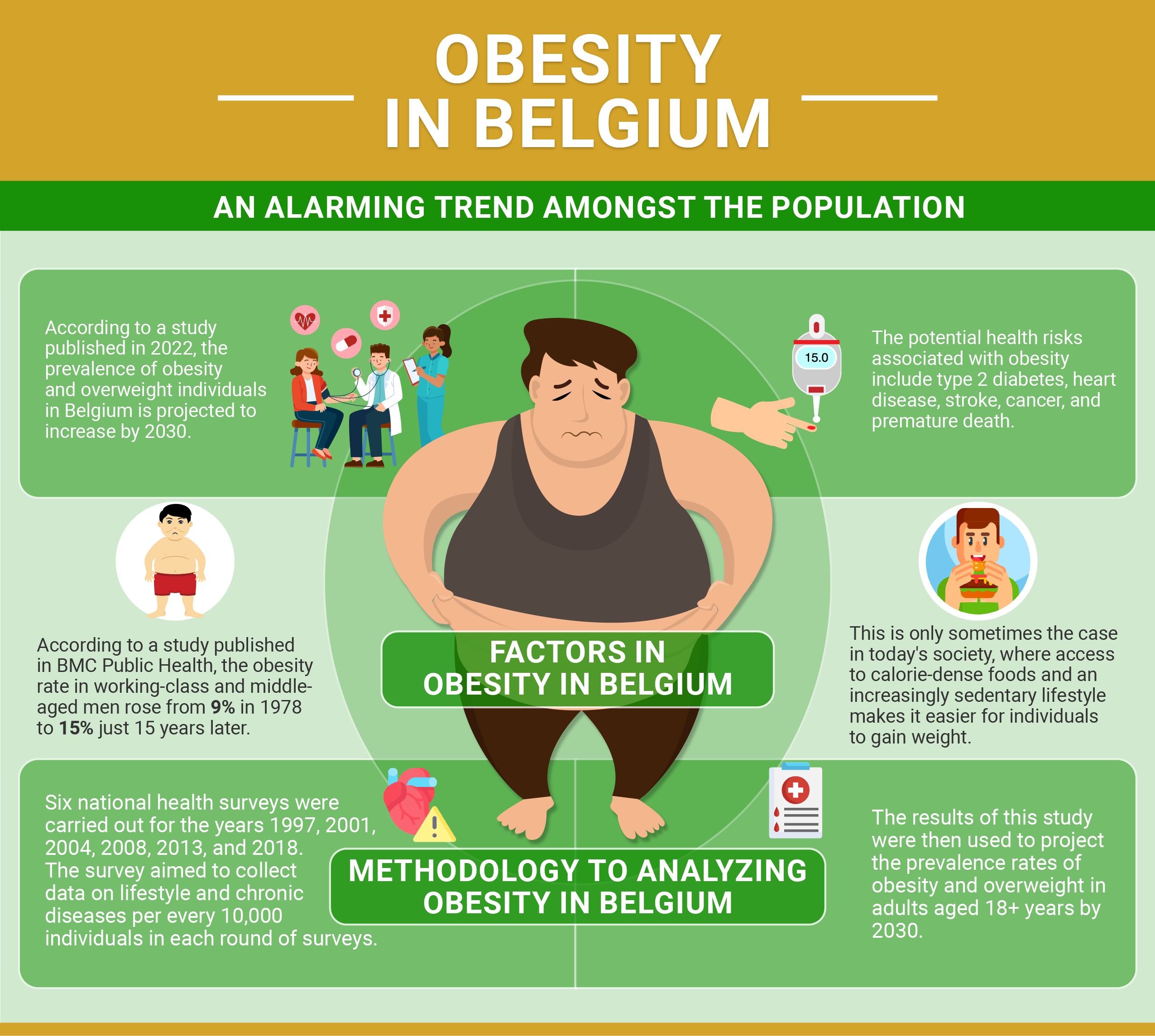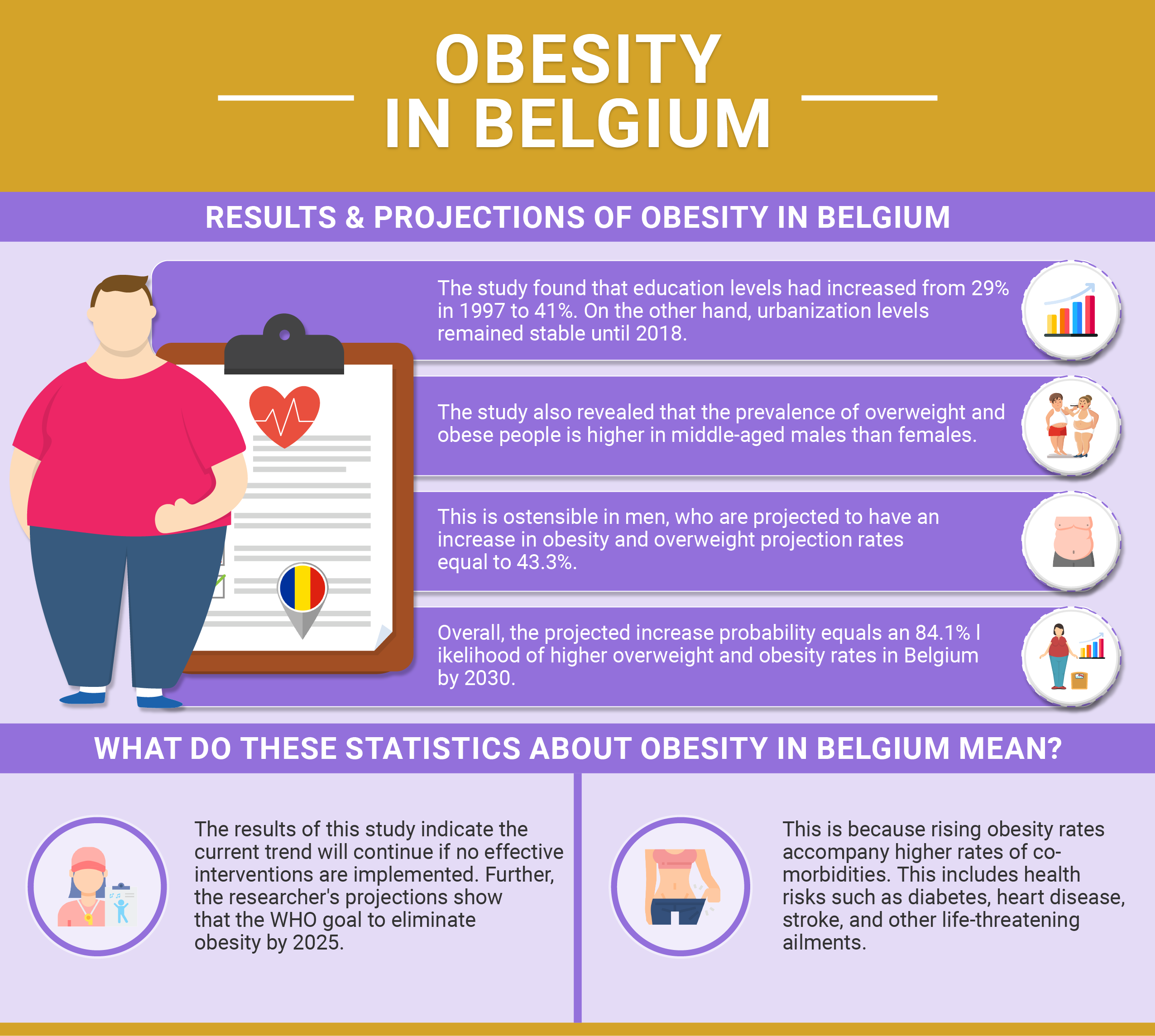
Obesity is a significant public health concern plaguing many countries worldwide. In Belgium, the prevalence of obesity and overweight individuals is increasing at an alarming rate, particularly among adults. According to a study published in 2022, the prevalence of obesity and overweight individuals in Belgium is projected to increase by 2030. The study used height and weight measurements from 58,369 adults aged 18 and older and collected data from 6 consecutive cross-sectional surveys between 1997 and 2018. The prevalence of obesity and overweight was observed to have increased between 1997 and 2018 in men and women, particularly within the middle-aged group. Based on these findings, the study predicts that obesity prevalence will continue to rise by 2030, especially among men and women.
The potential health risks associated with obesity include type 2 diabetes, heart disease, stroke, cancer, and premature death. It is, therefore, essential that effective prevention strategies are put in place to address this growing public health concern in Belgium. While the WHO has echoed the need for change in weight gain and obesity rates in Belgium, these findings reveal that The WHOs' objective of stopping obesity by 2025 is unlikely to be achieved without significant intervention.
The obesity epidemic is a global issue that requires individual and governmental attention. In Belgium, the problem of obesity is particularly alarming among adults. According to a study published in BMC Public Health, the obesity rate in working-class and middle-aged men rose from 9% in 1978 to 15% just 15 years later. Since then, this trend has continued to rise amongst all parts of the Belgian population. The prevalence of obesity amongst adults in Belgium is now at a staggering 59.5%.
Many competing factors contribute to obesity and weight gain. These include demographic factors such as sex, education level, age, and race. Additionally, the generation effect could play a role here as well. This refers to an individual's willingness to accept and conform to social changes. For example, in previous generations, there was a greater emphasis on physical activity and healthy eating. Unfortunately, this is only sometimes the case in today's society, where access to calorie-dense foods and an increasingly sedentary lifestyle makes it easier for individuals to gain weight.
Obesity and overweight are serious public health concerns projected to continue increasing in Belgium if no effective interventions are implemented. Statistical analyses were performed using datasets from the Belgian Health Interview Survey (BHIS). In doing so, six national health surveys were carried out for the years 1997, 2001, 2004, 2008, 2013, and 2018. The survey aimed to collect data on lifestyle and chronic diseases per every 10,000 individuals in each round of surveys. The current study examines independent variables such as age, sex, education level, migration background, urbanization level, income level, and height and weight. In addition, income, education, and urbanization levels were examined to gain further insight into socioeconomic variables.
In doing so, researchers determined varying obesity and overweight prevalence levels in different demographics. Next, the association between these independent variables and the prevalence of obesity and overweight adults was examined using age-period cohorts (APC). The results of this study were then used to project the prevalence rates of obesity and overweight in adults aged 18+ years by 2030.

The study found that education levels had increased from 29% in 1997 to 41%. On the other hand, urbanisation levels remained stable until 2018, when it was noted at 47%. Alternatively, rural and suburban areas saw a 15% increase and a 13% increase, respectively. In terms of the income distribution, studies indicated those with high incomes experienced increases while lower-income groups saw decreases over the years; further, the number of non-EU immigrants doubled from approximately 5% in 1997 to 11% in 2018. The study also revealed that the prevalence of overweight and obese people is higher in middle-aged males than females. Moreover, it increased over time for both men and women - but not nearly to similar degrees or levels yet (men had a more substantial increase). There were also apparent increases among older generations born before 1915; however, these rates have stabilized.
The future projections for obesity and overweight levels in Belgium are dismal, with a high likelihood of increased rates by 2030. This is ostensible in men, who are projected to have an increase in obesity and overweight projection rates equal to 43.3%. The numbers are even higher for women, with the prospect of reaching increased overweight and obesity levels of 57.6% and 56% per cent, respectively. Overall, the projected increase probability equals an 84.1% likelihood of higher overweight and obesity rates in Belgium by 2030.
Belgium is currently facing a critical public health crisis due to an increase in the prevalence of overweight and obesity. The results of this study indicate the current trend will continue if no effective interventions are implemented. Further, the researcher's projections show that the WHO goal to eliminate obesity by 2025 will likely not be accomplished, especially not in Belgium. Therefore, there is an urgent necessity for policymakers to implement effective prevention policies and other strategies for people who are at risk for developing weight gain and obesity. Within the next ten years, Belgium could look very different health-wise. This is because rising obesity rates accompany higher rates of co-morbidities. This includes health risks such as diabetes, heart disease, stroke, and other life-threatening ailments that can largely impact population health.
Obesity is a global epidemic, and it’s time to do something about it. That’s why Weight Loss Coach provides valuable resources and support to those who need it most. We are dedicated to helping people in Belgium lose weight, improve their health, and feel better about themselves. We understand the importance of having a healthy and happy population, so we are dedicated to fighting obesity in Belgium. Our team of physicians can create a weight loss plan specific to each individual’s body type and genetics. By working with weight loss coach, individuals in Belgium can quickly achieve their dream lifestyle.

Comments